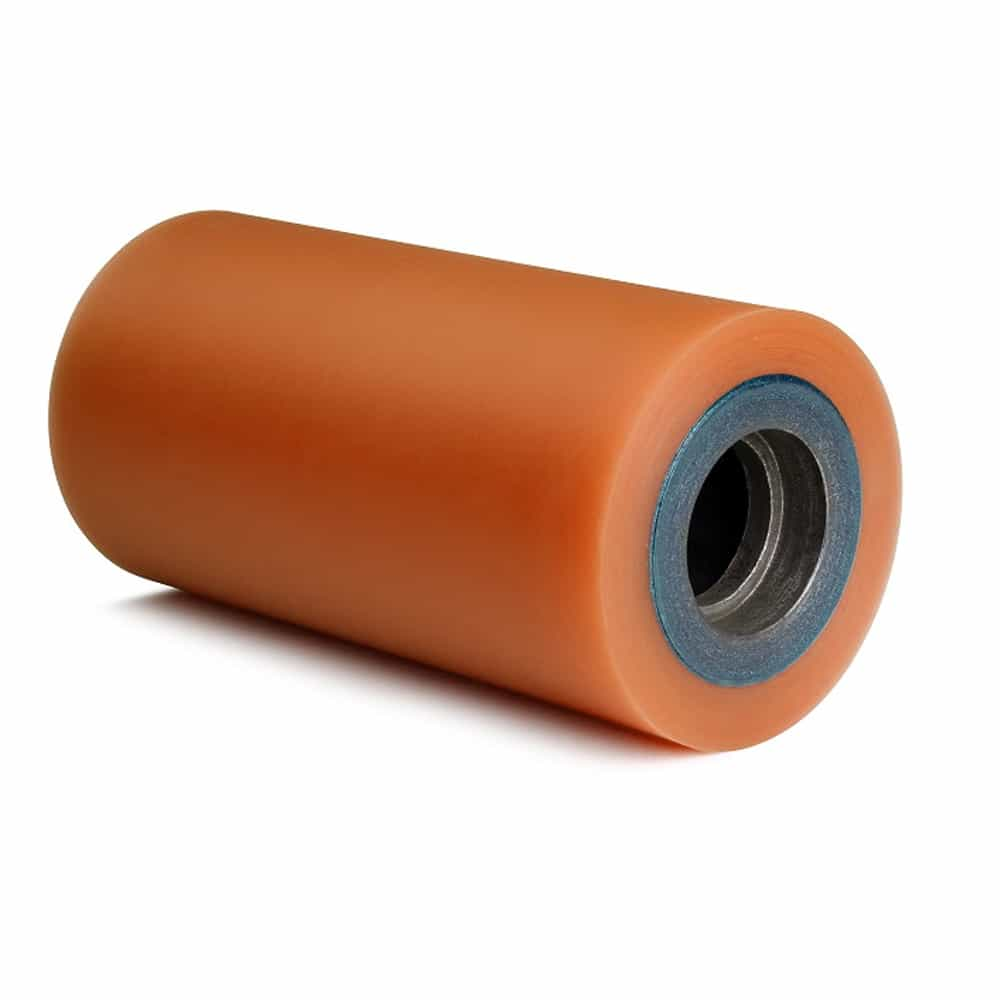

Sign in
New customer? Start here
Features of High-Quality Polyurethane Rollers
In the fast-paced industrial world, there is a constant search for materials with superior physical properties, such as high tensile strength and abrasion resistance. Polyurethane rollers offer a perfect solution to this. They're incredibly durable, flexible, and perform well in many industrial settings.
This blog explores features of high-quality polyurethane rollers and how they can be customized to suit various industries.
Overview of Polyurethane Rollers
Polyurethane rollers are made from a type of strong, flexible plastic known as polyurethane. Polyurethane gives rollers a boost, making them tougher against wear and tear and able to shrug off chemicals. This means they can handle more than natural rubber rollers and last longer, too.

Polyurethane rollers are widely used in various industries.
- In manufacturing, they help move products along conveyor systems smoothly and efficiently.
- In the printing industry, these rollers are vital for feeding paper and applying ink uniformly, ensuring high-quality print output.
- In packaging, they play a key role in sealing and cutting processes.
Additionally, due to their resistance to oil, grease, and other chemicals, polyurethane rollers ensure reliable performance in material handling, automotive production, and food processing industries under harsh conditions.
Key Features of High-Quality Polyurethane Rollers
Durability and Wear Resistance
Polyurethane rollers are preferred in the industrial world because they're incredibly tough to handle dynamic loads, tough conditions and heavy use with super wear resistance. These rollers last longer than rubber rollers, which means they don’t need to be replaced often
Roller makers build these rollers to be extra strong, so they can take on heavy loads without any trouble. That makes them just right for tough jobs that need a lot of power and can keep going for a long time.
High Load-Bearing Capacity
Polyurethane rollers are built to carry heavy loads, keeping their shape and working well even under lots of pressure. This ability to carry a lot of weight is really important for industries that move heavy items around, like material handling and conveyor systems. These rollers help make sure big, heavy items move along smoothly and safely.
Chemical and Corrosion Resistance
Polyurethane is super tough against lots of chemicals—it doesn't mind solvents, oils, acids, or alkalis. This is because its molecules are tightly bound and it has a mix of hard and soft parts in its makeup.
Because of this, polyurethane rollers are perfect for places that are wet all the time, like in food processing and chemical plants. They're made to stay strong even when they get wet, so they can work in conditions that would make other materials, like rubber rollers, wear out faster.
Temperature Tolerance
Polyurethane rollers are designed to handle all kinds of temperatures better than most materials, whether it's hot or cold. This means they stay dependable in extreme temperatures where plastics and rubbers tend to become brittle or soft.
Low Friction and Noise Reduction
Polyurethane rollers are crafted to slide parts of machinery against each other with smooth operation and quiet function. The reasons include:
- Reduced Friction: The rollers feature a polished surface that ensures objects glide smoothly without catching or sticking, significantly reducing friction.
- Noise absorption: The material soaks up vibrations, so there's less noise when things move.
Key uses of polyurethane rollers include conveyor systems, material handling, office equipment, automotive and food processing.
For example, for medical equipment, polyurethane rollers ensure quiet operation in imaging and diagnostics for patient comfort and accuracy.
In office equipment, they're used in printers and photocopiers for smooth document feeding and minimal noise.
Versatility in Customization
Table 1 Various customization options available for polyurethane rollers
|
Customization Feature |
Performance Enhancement |
Ideal Applications |
|
Size Adjustment |
Perfect fit in machinery |
Machinery, Conveyors |
|
Hardness Variation |
Suit different loads |
Heavy-duty, Shock-absorbing |
|
Color Coding |
Identification aid |
Maintenance, Replacement |
|
Surface Texture |
Increased grip |
Packaging, Printing |
|
Chemical Resistance |
Withstand harsh chemicals |
Food processing, Chemical industry |
|
Thermal Stability |
Reliable in extreme temps |
Cold storage, High-heat environments |
|
Load Capacity |
Support heavier weights |
Heavy machinery, Material handling |
|
Core Material Selection |
Affect weight and strength |
Various industries |
|
Special Features |
Additional functionalities |
Medical imaging, Food processing |
|
Durometer Selection |
Impact resilience and lifespan |
Manufacturing, Industrial equipment |
Polyurethane rollers are incredibly versatile, ranging from conveyor rollers designed for the rigorous demands of food processing to custom solutions for industrial machinery. You can easily adjust their size, hardness, and color to suit any need.
They're designed to handle just the right amount of friction, resist chemicals, and stay steady in different temperatures. Besides, they offer a selection of surface textures, ranging from smooth to textured, and allow for the choice of an appropriate core tailored to specific applications.
Easy Maintenance and Longevity
High-quality polyurethane rollers require minimal maintenance due to their durability and resistance to damage.
Polyurethane rollers have both a long service life and cost-effectiveness:
- Long-lasting: They're designed to endure long-term use without losing their performance, which means they don't need to be replaced often.
- Cost-Saving: Fewer replacements and low maintenance needs translate to significant savings over time.
- Efficiency: By requiring less upkeep, they contribute to the overall efficiency of operations, reducing downtime and repair costs.
- Value for Money: Choosing polyurethane rollers is a wise decision because they last longer, which means the initial investment is worth it in the long run.
Because of these strengths, polyurethane rollers are a great pick for any job where something dependable without much cost to own and care for is needed.
Applications of High-Quality Polyurethane Rollers
Polyurethane rollers are invaluable across various sectors, hanks to their durability, chemical resistance, and low maintenance requirements.
Manufacturing and Production
In places like warehouses and shipping hubs, polyurethane rollers keep conveyor belts rolling smoothly. They're perfect for handling packages and goods with care and efficiently.
Material Handling and Conveyors
Polyurethane rollers are common in assembly lines for their ability to handle various materials with minimal friction and noise.
They're are great at wear resistance and can take on heavy loads. This makes them perfect for smoothly running conveyor belts that need to move items around with ease and efficiency.
Automotive Industry
In car manufacturing, polyurethane rollers are used for the assembly and transportation of parts and ensure smooth operation of parts like door and hood mechanisms. They also aiding in quality control and production line maintenance.
Printing and Packaging
- In industries like printing and packaging, where things have to be just right, polyurethane rollers are super important. They handle materials gently and with exact precision, which helps keep the quality high.
- In places like warehouses and shipping hubs, polyurethane rollers keep conveyor belts rolling smoothly. They're perfect for handling packages and goods with care and efficiently.
How to Choose the Right Polyurethane Rollers
When choosing the right polyurethane rollers, think about these key points to make sure they're perfect for your needs:
- Load Capacity: Start by determining the weight your rollers will need to support. Choose rollers that have the strength to manage your most substantial loads without any trouble.
- Chemical Exposure: If your rollers will be around chemicals, choose ones that can stand up to them. Polyurethane is usually good at resisting chemicals, but it's worth checking for the specific chemicals you have.
- Environmental Conditions: Think about where the rollers will work. Whether it's a hot, cold, damp, or dusty environment, ensure the polyurethane is up to the task and can stand up to those conditions.
- Durability: You want rollers that will last a long time, so go for ones that are made to be tough and long-lasting.
- Size and Shape: Choose rollers that are just the right size and shape for your needs. They need to work well and fit in seamlessly with the rest of your machinery.
- Maintenance: Keep in mind that while all rollers are pretty easy to look after, some might need a bit more attention than others. Even though polyurethane rollers require low-maintenance, it's helpful to know the specific care they need.
- Cost: Last but not least, consider your budget. It's worth noting that investing a little more upfront can get you rollers with a longer lifespan, which could actually save you money in the long haul.
Conclusion
Polyurethane rollers are a go-to choice in industry for their durability, wide range of customization, and cost-effectiveness.
These rollers really stand out because they're tough against wear, can handle all kinds of temperatures, and are strong enough to support heavy loads. This helps things run more smoothly and efficiently.
Picking the best quality rollers is really important for making your industrial systems work better and last longer. They're a big part of what makes manufacturing successful.
Keep Learning







